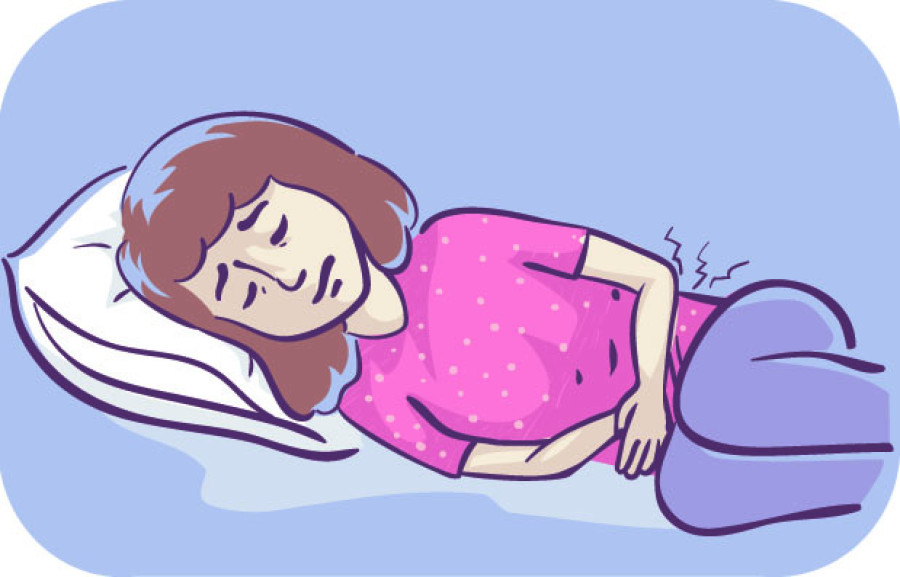Health
What’s the best way to treat period cramps?
Dysmenorrhea is the most common gynaecological condition, but many women are unsure whether they should seek medical help or rely on homemade remedies.
June Karkee
For at least two days every month, 18-year-old Apeksha Khadka is forced to set aside her schedule to bear with the excruciating pain of menstrual cramps. The agony is so awful that she loses her appetite and it affects her entire body.
“I’m always forced to return home from college because the pain gets so unbearable. I always end up throwing up, and it is only after that, that I feel slightly better,” said Khadka.
Medically termed as dysmenorrhea, menstrual cramps are experienced during the onset of the monthly period cycle. The symptoms can significantly affect a female’s productivity and quality of life, restricting activity and causing absenteeism from work and school. Yet females are, and continue to be, unsure on whether seeking medical help is the best approach to relieving pain, with many instead relying on more natural and homemade remedies to cope.
Khadka, who started menstruating when she was 14 years old, started suffering severe cramps two years after she got her first period but has not yet sought medical treatment because she believes there are many associated risks.
“So far I haven’t taken any medicine for my cramps because I hear they have some serious side effects, which could harm my reproductive system later on,” she said. “Instead, for two days I tolerate the pain just by drinking plenty of water and getting a lot of rest.”
Dysmenorrhea is regarded as the most common gynaecological condition in females, regardless of age and nationality. Ranging from mild to severe, it occurs when the uterus, or womb, contracts. It is linked to symptoms such as pain in the abdomen, hips and lower back, loose stool, upset stomach and in extreme cases like Khadka’s, vomiting.
Hinkish Dhakal, 21, who suffers from severe dysmenorrhea, also tries to avoid painkillers. Dhakal instead uses home remedies learnt from her mother to treat her cramps.
“I don’t take anything for the pain until I absolutely have to because I don’t want to put pills in my body, and also there are a lot of side effects,” she said. “I do homemade treatments, like drinking tea with ghee, which is something my mom told me about and it actually helps a lot.”
While Khadka and Dhakal fear the side effects of taking pain relief medication, and believe it is better to abstain for as long as possible, medical doctors recommend dysmenorrhea sufferers take painkillers such as paracetamol in less severe cases, and if that does not help, resort to nonsteroidal anti-inflammatory drugs (NSAIDs) like Meftal and Ibuprofen.
“Menstruation is a natural thing and therefore cramps should, for the most part, be treated with natural remedies such as using heat pads, drinking plenty of fluids and getting rest,” says Dr Achala Vaidya, head of the Obstetrics & Gynaecology Department at Norvic Hospital.
Bipasayna Singh Adhikari used to refrain from taking medicine to treat her cramps because her mother would tell her it was harmful but now, with her doctor’s assurance and advice, she takes them frequently.
“I take Meftal-500 mg as soon as I notice any sign of being on my period, even if I’m not immediately having severe cramps, because I’ve found the medicine to be most effective that way—when I start feeling pain,” the 22-year-old said.
But these medications, used frequently and over time, can be harmful, according to Dr Vaidya.
“Painkillers, such as Ibuprofen, used frequently cause side effects like hyperactivity in the body and over time can also lead to kidney problems,” she told the Post.
Because of such issues, 36-year-old mother Sushmita Shrestha has decided not to use painkillers, even after her doctor’s recommendation, because she believes they do more harm than good. She doesn’t allow her daughter to take them either.
“All my life I have simply endured the pain and not taken any medicine and I’ve been fine, so I don’t see why my daughter would put unnecessary chemicals inside her body just because these medicines exist now,” said Shrestha.
Furthermore, there is plenty of research pointing out both the short-term and long-term effects of using NSAIDs and other types of pain relief medication. According to an article published by Harvard Medical School, people who take NSAIDs regularly are more prone to having increased heart risks, reduced blood flow to the kidneys, which over time develops ulcers and causes bleeding in the gastrointestinal tract.
But for 22-year-old Dipshika Giri, these side effects have little to do with why she doesn’t take medication.
“I’m not as concerned about the side effects of taking medicines as I am about my tolerance level for pain because I feel like taking medicine all the time would make me used to it, and I could end up having to take medicine for even the slightest amount of pain,” said Giri.
Like Khadka and Dhakal, Giri also relies on natural remedies to subsist and resorts to medicine only as her last option.
“I take medicines only during exams and when I have to go out, other times I stay home, eat lots of fruit and dark chocolate, and drink lots of water and soup,” she said.
While it seems that women might be divided on how they deal with menstrual cramping, balance is crucial, according to Dr Vaidya.
“Although ultimately it is the individual’s choice, medication should not be the first option,” she said. “And if the pain is extremely severe, it could even be an underlying problem that the person should get checked.”




 14.12°C Kathmandu
14.12°C Kathmandu















